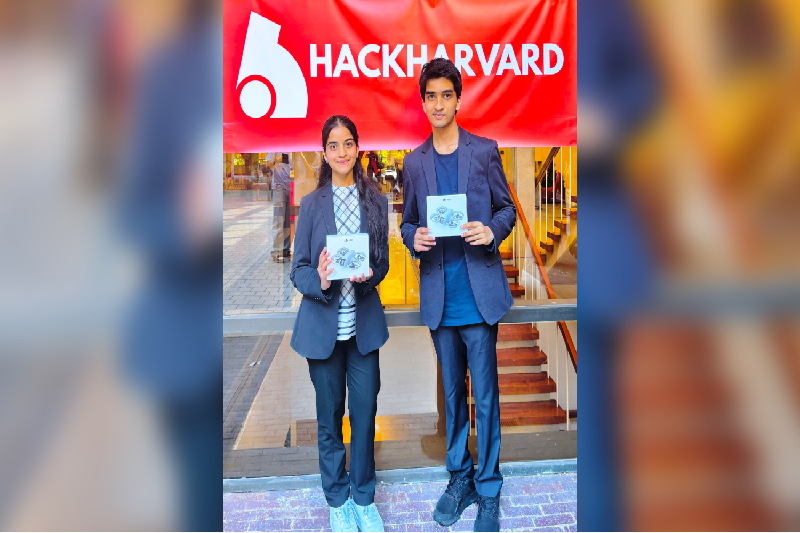
Chennai-Born Twins Triumph at HackHarvard 2025 with Life-Saving AR App
Pushing Boundaries at a Global Hackathon
On a Friday afternoon in 2025, instead of winding down in their college dorm, Chennai-born twins packed their backpacks, caught a train, and embarked on a five-hour bus ride from New Jersey to Boston, Massachusetts. Their destination: Harvard University, host of HackHarvard 2025—a prestigious hackathon that draws the brightest student innovators from around the world.
As second-year students pursuing degrees in Computer Science, Artificial Intelligence, and Cognitive Science at Rutgers University Honors College, the twins have developed a passion for hackathons. These 24-hour coding marathons are high-intensity exercises in creativity, problem-solving, and collaboration. For the duo, HackHarvard 2025 presented an opportunity to test their technical skills and creativity in one of the most competitive student tech arenas.
Choosing the Perfect Challenge
The competition opened with several thematic tracks, including Sustainability, Security, and Entertainment. The twins were immediately drawn to the Infosys Human Augmentation Track, which tasked participants with creating immersive technology to enhance human capabilities. It was within this challenge that their project, Halo, began to take shape.
Halo, an acronym for Help and Life-Saving Augmented Reality Overlay, was inspired by a deeply personal experience. The twins’ mother, who has lived with Type 1 diabetes for over 18 years, had suffered a near-fatal episode of Diabetic Ketoacidosis (DKA) the previous year. Doctors emphasized that her survival depended not just on medical care, but on the rapid recognition of the emergency and timely action in the crucial first minutes.
Motivated by this experience, the twins envisioned a solution that could prevent others from feeling helpless during medical crises. Halo became an iOS app that leverages Augmented Reality (AR) and Voice AI to guide users through emergencies, enabling quick, confident, life-saving responses.
The Overnight Coding Marathon
At 8:00 p.m., the twins opened their laptops, outlined their plan, and began coding. Halo was developed as a Swift-native iOS app compatible with standard iPhones and iPads, eliminating the need for specialized headsets or equipment. Consistent with their hackathon approach, the twins experimented with advanced motion-tracking and AR, pushing their skills to the limit.
By midnight, the competition hall was alive with students from over 30 countries, all united by a shared passion for building. Despite the energy, challenges arose: motion-tracking repeatedly failed, tempting the duo to scale back their project. Yet, they reminded themselves that hackathons reward persistence and rapid prototyping rather than perfection. By dividing tasks strategically and working through the night, they successfully brought Halo to life, ready for the judges’ evaluation.
Recognition and Victory
When Halo was announced as the first-place winner in the Infosys Human Augmentation Track, the twins experienced an elation that marked a milestone in their academic and personal journeys. This victory represented their sixth hackathon win of 2025, but more importantly, it validated the life-saving mission that inspired Halo.
Winning was thrilling, but the experience offered more than accolades. The twins reflected on the value of the process: the long hours of coding, the persistence required to troubleshoot bugs, and the opportunity to collaborate with peers from around the world. The friendships formed and lessons learned in those intense 24 hours proved to be as valuable as the award itself.
Looking Ahead: Scaling Halo
The twins plan to continue refining Halo, aiming to deploy it in schools, workplaces, and public spaces as a practical emergency-response tool. They are exploring partnerships with medical institutions to ensure the guidance provided by Halo is accurate, intuitive, and effective.
Halo’s design allows even individuals without medical training to respond decisively in emergencies. By combining AR overlays with step-by-step voice instructions, the app transforms high-stress situations into manageable, guided actions. This approach has the potential to significantly improve emergency response outcomes and empower ordinary people to act confidently.
Lessons Beyond Coding
For the twins, Halo demonstrated that technology achieves its greatest impact when it directly benefits people’s lives. While hackathons are often viewed as competitive contests, the true value lies in creativity, collaboration, resilience, and learning under pressure. Every late-night coding session, every bug fixed, and every problem solved contributed to an experience that extended far beyond programming skills.
HackHarvard 2025 underscored the importance of connecting personal experiences to technical innovation. By transforming a life-altering family event into a technological solution, the twins were able to create an app that is both functional and profoundly meaningful.
The Spark That Drives Innovation
Halo is more than a project or a winning hackathon entry. For the twins, it represents the essence of why they pursue technology: the opportunity to create meaningful solutions that improve human lives. HackHarvard 2025 offered them the chance to combine technical skill, creativity, and empathy into a single, impactful project.
The experience left an enduring impression. Beyond the thrill of victory and applause, the twins gained a deeper understanding of the power of innovation when it serves a tangible purpose. Halo’s journey is a testament to how personal motivation, when combined with technical expertise, can spark solutions that have real-world impact.
As the twins continue their studies in Computer Science, AI, and Cognitive Science at Rutgers University, Halo remains a reminder that the true reward of innovation lies not in recognition, but in creating tools and technologies that empower people. Hackathons, late nights, and intense problem-solving sessions are all part of the journey—an essential journey that transforms ideas into actions capable of saving lives.



